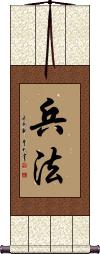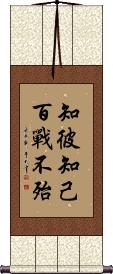Many custom options...
And formats...

Sunzi in Chinese / Japanese...
Buy a Sunzi calligraphy wall scroll here!
Personalize your custom “Sunzi” project by clicking the button next to your favorite “Sunzi” title below...
Art of War
Art of War: 5 Points of Analysis
道天地將法 is a list of five key points to analyzing your situation from the first chapter of Sun Tzu's Art of War.
This reads like a 5-part military proverb. Sun Tzu says that to sharpen your skills, you must plan. To plan well, you must know your situation. Therefore, you must consider and discuss the following:
1. Philosophy and Politics: Make sure your way or your policy is agreeable among all of your troops (and the citizens of your kingdom as well). For when your soldiers believe in you and your way, they will follow you to their deaths without hesitation and will not question your orders.
2. Heaven/Sky: Consider climate / weather. This can also mean considering whether God is smiling upon you. In the modern military, this could be waiting for clear skies so that you can have air support for an amphibious landing.
3. Ground/Earth: Consider the terrain in which the battle will take place. This includes analyzing defensible positions, and exit routes, while using varying elevations to your advantage. When you plan an ambush, you must know your terrain and the best location from which to stage that ambush. This knowledge will also help you avoid being ambushed, as you will know where the likely places in which to expect an ambush from your enemy.
4. Leadership: This applies to you as the general and your lieutenants. A leader should be smart and be able to develop good strategies. Leaders should keep their word, and if they break a promise, they should punish themselves as harshly as they would punish subordinates. Leaders should be benevolent to their troops, with almost a fatherly love for them. Leaders must have the ability to make brave and fast decisions. Leaders must have steadfast principles.
5. [Military] Methods: This can also mean laws, rules, principles, models, or systems. You must have an efficient organization in place to manage both your troops and supplies. In the modern military, this would be a combination of how your unit is organized and your SOP (Standard Operating Procedure).
Notes: This is a simplistic translation and explanation. Much more is suggested in the actual text of the Art of War (Bing Fa). It would take a lot of study to master all of these aspects. In fact, these five characters can be compared to the modern military acronyms such as BAMCIS or SMEAC.
CJK notes: I have included the Japanese and Korean pronunciations but in Chinese, Korean and Japanese, this does not make a typical phrase (with subject, verb, and object) it is a list that only someone familiar with Sun Tzu’s writings would understand.
Sun Tzu - Art of War
military strategy, tactics, and procedure
孫子兵法 is the full title of the most famous book of military proverbs about warfare.
The English title is “Sun Tzu's The Art of War.”
The last two characters have come to be known in the west as “The Art of War,” but a better translation would be “military strategy and tactics,” “military skills” or “army procedures.”
Note: Sometimes the author's name is Romanized as “Sun Zi” or “Sunzi.”
It's written the same in Chinese, Japanese Kanji, and Korean Hanja.
Furinkazan
military strategy
風林火山 is the battle strategy and proverb of Japanese feudal lord Takeda Shingen (1521-1573 AD).
This came from the Art of War by Chinese strategist and tactician Sun Tzu (Sunzi).
You can think of this as an abbreviation to remind officers and troops how to conduct battle.
風林火山 is a word list: Wind, Forest, Fire, Mountain.
The more expanded meaning is supposed to be...
“Swift as the wind, quiet as the forest, fierce as fire, and immovable as a mountain”
“As fast as the wind, as quiet as the forest, as daring as fire, and immovable as the mountain”
“Move as swift as the wind, stay as silent as a forest, attack as fierce as fire, undefeatable defense like a mountain”
“Move swiftly like the wind, stay silent like the forest, attack fiercely like fire, take a tactical position on the mountain”
See Also: Art of War
Know Thy Enemy, Know Thyself
This proverb is from Sun Tzu's (Sunzi's) Art of War.
It means that if you know and understand the enemy, you also know yourself. Four secondary characters come after this in the Art of War (not included here) which suggests you cannot lose a battle when you follow this philosophy.
In a very literal and somewhat-boring way, this can also be translated as “Estimate correctly one's strength as well as that of one's opponent.”
Know Your Enemy, Know Yourself, and You Cannot Lose
知彼知己百戰不殆 is from Sun Tzu's (Sunzi's) Art of War. It means that if you know and understand the enemy, you also know yourself, and thus with this complete understanding, you cannot lose.
This proverb is often somewhat directly translated as “Know the enemy and know yourself, and you can fight a hundred battles without defeat.”
It can also be translated as “If you know both yourself and your enemy, you can come out of hundreds of battles without danger,” or “Know your enemy, know yourself, and your victory will not be threatened.”
Not the results for sunzi that you were looking for?
Below are some entries from our dictionary that may match your sunzi search...
| Characters If shown, 2nd row is Simp. Chinese |
Pronunciation Romanization |
Simple Dictionary Definition |
知彼知己 see styles |
zhī bǐ zhī jǐ zhi1 bi3 zhi1 ji3 chih pi chih chi |
More info & calligraphy: Know Thy Enemy, Know Thyself |
諸子 诸子 see styles |
zhū zǐ zhu1 zi3 chu tzu moroko; moroko もろこ; モロコ |
various sages; refers to the classical schools of thought, e.g. Confucianism 儒[ru2] represented by Confucius 孔子[Kong3 zi3] and Mencius 孟子[Meng4 zi3], Daoism 道[dao4] by Laozi 老子[Lao3 zi3] and Zhuangzi 莊子|庄子[Zhuang1 zi3], Mohism 墨[mo4] by Mozi 墨子[Mo4 zi3], Legalism 法[fa3] by Sunzi 孫子|孙子[Sun1 zi3] and Han Feizi 韓非子|韩非子[Han2 Fei1 zi3], and numerous others (1) (kana only) gudgeon (any fish of genus Gnathopogon or related genera); (2) (See 本諸子) willow gudgeon (Gnathopogon caerulescens); (3) (See 九絵) longtooth grouper (species of fish, Epinephelus bruneus); (surname, female given name) Moroko children |
百戰不殆 百战不殆 see styles |
bǎi zhàn bù dài bai3 zhan4 bu4 dai4 pai chan pu tai |
to come unscathed through a hundred battles (idiom, from Sunzi's "The Art of War" 孫子兵法|孙子兵法[Sun1 zi3 Bing1 fa3]); to win every fight |
知己知彼 see styles |
zhī jǐ zhī bǐ zhi1 ji3 zhi1 bi3 chih chi chih pi |
know yourself, know your enemy (idiom, from Sunzi's "The Art of War" 孫子兵法|孙子兵法[Sun1 zi3 Bing1 fa3]) |
諸子十家 诸子十家 see styles |
zhū zǐ shí jiā zhu1 zi3 shi2 jia1 chu tzu shih chia |
various sages and ten schools of thought; refers to the classical schools of thought, e.g. Confucianism 儒[ru2] represented by Confucius 孔子[Kong3 zi3] and Mencius 孟子[Meng4 zi3], Daoism 道[dao4] by Laozi 老子[Lao3 zi3] and Zhuangzi 莊子|庄子[Zhuang1 zi3], Mohism 墨[mo4] by Mozi 墨子[Mo4 zi3], Legalism 法[fa3] by Sunzi 孫子|孙子[Sun1 zi3] and Han Feizi 韓非子|韩非子[Han2 Fei1 zi3], and numerous others |
置之死地而後生 置之死地而后生 see styles |
zhì zhī sǐ dì ér hòu shēng zhi4 zhi1 si3 di4 er2 hou4 sheng1 chih chih ssu ti erh hou sheng |
(idiom based on Sunzi's "The Art of War" 孫子兵法|孙子兵法[Sun1zi3 Bing1fa3]) to deploy one's troops in such a way that there is no possibility of retreat, so that they will fight for their lives and win the battle; to fight desperately when confronted with mortal danger; to find a way to emerge from a dire situation |
出其不意,攻其不備 出其不意,攻其不备 see styles |
chū qí bù yì , gōng qí bù bèi chu1 qi2 bu4 yi4 , gong1 qi2 bu4 bei4 ch`u ch`i pu i , kung ch`i pu pei chu chi pu i , kung chi pu pei |
to catch an enemy off guard with a surprise attack (idiom, from Sunzi's "The Art of War" 孫子兵法|孙子兵法[Sun1 zi3 Bing1 fa3]) |
知己知彼,百戰不殆 知己知彼,百战不殆 see styles |
zhī jǐ zhī bǐ , bǎi zhàn bù dài zhi1 ji3 zhi1 bi3 , bai3 zhan4 bu4 dai4 chih chi chih pi , pai chan pu tai |
know yourself and know your enemy, and you will never be defeated (idiom, from Sunzi's "The Art of War" 孫子兵法|孙子兵法[Sun1 zi3 Bing1 fa3]) |
知彼知己,百戰不殆 知彼知己,百战不殆 see styles |
zhī bǐ zhī jǐ , bǎi zhàn bù dài zhi1 bi3 zhi1 ji3 , bai3 zhan4 bu4 dai4 chih pi chih chi , pai chan pu tai |
knowing the enemy and yourself will get you unscathed through a hundred battles (idiom, from Sunzi's "The Art of War") |
The following table may be helpful for those studying Chinese or Japanese...
| Title | Characters | Romaji (Romanized Japanese) | Various forms of Romanized Chinese | |
| Art of War | 兵法 | hyou hou / hyouhou / hyo ho | bīng fǎ / bing1 fa3 / bing fa / bingfa | ping fa / pingfa |
| Art of War: 5 Points of Analysis | 道天地將法 道天地将法 | dou ten chi shou hou doutenchishouhou do ten chi sho ho | dào tiān dì jiàng fǎ dao4 tian1 di4 jiang4 fa3 dao tian di jiang fa daotiandijiangfa | tao t`ien ti chiang fa taotientichiangfa tao tien ti chiang fa |
| Sun Tzu - Art of War | 孫子兵法 孙子兵法 | son shi hyou hou sonshihyouhou son shi hyo ho | sūn zǐ bīng fǎ sun1 zi3 bing1 fa3 sun zi bing fa sunzibingfa | sun tzu ping fa suntzupingfa |
| Furinkazan | 風林火山 风林火山 | fuu rin ka zan fuurinkazan fu rin ka zan | fēng lín huǒ shān feng1 lin2 huo3 shan1 feng lin huo shan fenglinhuoshan | |
| Know Thy Enemy, Know Thyself | 知彼知己 | zhí bǐ zhí jī zhi2 bi3 zhi2 ji1 zhi bi zhi ji zhibizhiji | chih pi chih chi chihpichihchi |
|
| Know Your Enemy, Know Yourself, and You Cannot Lose | 知彼知己百戰不殆 知彼知己百战不殆 | zhí bǐ zhí jī bǎi zhàn bú dài zhi2 bi3 zhi2 ji1 bai3 zhan4 bu2 dai4 zhi bi zhi ji bai zhan bu dai zhibizhijibaizhanbudai | chih pi chih chi pai chan pu tai | |
| In some entries above you will see that characters have different versions above and below a line. In these cases, the characters above the line are Traditional Chinese, while the ones below are Simplified Chinese. | ||||
Successful Chinese Character and Japanese Kanji calligraphy searches within the last few hours...









